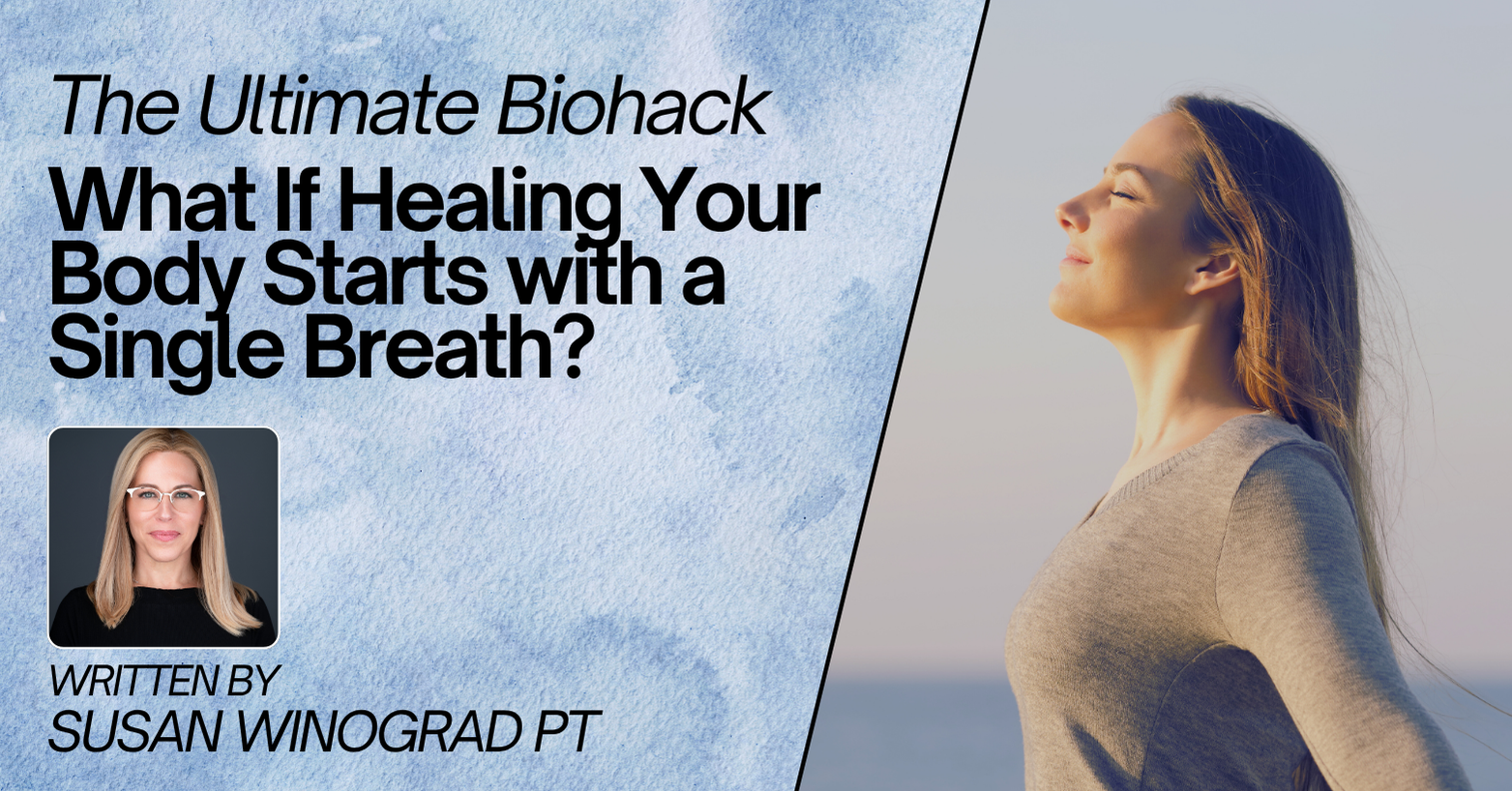

Susan is the owner and founder of Pelvicore Rehab & Wellness. Susan earned a masters degree from the College of Staten Island in 1998. During her almost 30 years of experience, she has gained extensive knowledge in the treatment of various populations such as orthopedics, manual therapy, geriatrics, pediatrics and men/women's pelvic dysfunction and treatment of the pregnant and postpartum women.
What’s the one thing that can calm you, energize you, help you sleep, detoxify body and mind, support digestion, balance your hormones, improve your workouts, enhance pelvic health, and optimize every system in your body?
Spoiler alert: it’s not a pill, supplement, or high-tech tracker.
It’s biohacking breath.
Yep. That thing you’ve been doing on autopilot since birth holds a power that most of us never tap into. But when do we? It’s one of the most transformative tools for healing, regulating, and reconnecting with your body.
Let’s dig into the science, the simplicity, and the soul of breath—and why I believe it’s the ultimate (and most underutilized) health tool available to all of us.
Here’s a wild truth: breathing is the only automatic function in the body that we can also control voluntarily. That means your breath is more than survival—it’s a tool for thriving.
As a pelvic health physical therapist, I see this daily. Clients come in with issues ranging from core weakness to pelvic pain, anxiety to digestion, and time and again, the missing link is breath. Not in a mystical, “woo-woo” way. In a grounded, evidence-based, anatomically brilliant way.
Think of your breath as a remote control to your nervous system, your pelvic floor, your posture, your digestion, and even your hormones. And the best part? You’re already carrying it with you, 24/7.
Let’s keep this simple. Your core is more than just abs. It’s a team of deep muscles that work together to support you in everything from sitting to sneezing to lifting heavy loads.
When you inhale, your diaphragm moves downward. Your ribs expand. And your pelvic floor lengthens, kind of like a hammock stretching gently.
When you exhale, your diaphragm rises and your pelvic floor lifts and tightens just a little.
This reflexive relationship supports alignment, digestion, belly pressure, circulation, and yes—even continence and sexual health.
If you’re recovering postpartum or going through menopause, how you breathe can be a game-changer. It can directly influence your strength, your healing, your hormone balance, and your ability to regulate stress.
In other words, your breath is a major determining factor in how you feel through these big life transitions.
When this system is off (think shallow breathing, high stress, poor posture), the pressure dynamics get skewed. And when the pressure’s off, symptoms start showing up: back pain, prolapse, leaking, core instability, constipation, or chronic tension.
One of the most immediate and powerful effects of intentional breathwork is on the nervous system.
Breath is a direct gateway to the nervous system. Most of us live in a high-stress, constantly connected “go mode”—our sympathetic nervous system is constantly humming with stress.
Breath has the most immediate and powerful effects on the nervous system. We can guide ourselves into parasympathetic—“rest and digest”—mode, especially through methods like box breathing (inhaling, holding, exhaling, and pausing for equal counts) or alternate nostril breathing (used in yogic practices) It can reduce anxiety, improve mental clarity, and even lower blood pressure within minutes.
This is where healing happens. This is where we recalibrate.
What most people don’t realize is that the diaphragm—your main breathing muscle—also plays an important role in digestion.
When you take full, deep belly breaths, your diaphragm gently massages your internal organs. Deep Breathing can help to reduce bloating, support gut motility, improve circulation, and enhance nutrient absorption.
Your breath is not just calming—it’s a functional tool for better digestion.
Many of my patients come in with “mystery symptoms”: leaking, painful intimacy, hip tightness, core weakness. What they don’t know is that the diaphragm and pelvic floor work synergistically. They rise and fall together with every breath.
When we breathe shallowly (hello, desk life and chronic stress), we can lose that synchrony. Muscles get tight, weak, or uncoordinated. And dysfunction sneaks in.
That’s why in my clinical practice, no matter what someone comes in for—whether it’s recovering after birth, thriving through menopause, or healing pelvic pain—we always start with the breath.
It’s not just physical—it’s deeply grounding. Breath is the bridge between your conscious and unconscious, your stress and your strength.
There’s no one-size-fits-all. There’s no “bad breath”—only mismatched breath for the task at hand. Your body may breathe rapidly in a spin class (great!), or deeply and slowly in yoga (also great!). The key is knowing how to breathe for the job at hand.
Stressed? You can downregulate.
Tired? You can energize.
Bloated? You can support digestion.
Recovering postpartum? You can restore core coordination.
Breath becomes your superpower. Your first line of regulation. Your “home button.”
If you’re raising an eyebrow right now, I get it. We live in a world obsessed with external fixes: supplements, wearables, trackers. Breath seems… too simple.
But the truth is, science and research back it, and simplicity wins!!
In his groundbreaking book Breath: The New Science of a Lost Art, journalist James Nestor dives deep into how our breathing has changed over time—and not for the better. Nestor reveals that many common health issues—from fatigue, sleep apnea, and anxiety to inflammation and posture problems—can be linked back to dysfunctional breathing patterns. His research highlights a simple but powerful truth: breath is not just essential for survival—it’s essential for thriving. When we learn how to use breath, we can dramatically improve our health. All without pills, surgeries, or high-tech interventions.
In a healthcare system that often overlooks prevention and downplays root-cause healing, breath is a radical act of self-leadership. It’s your invitation to participate in your healing, not just receive it.
And in my clinical experience, when clients reconnect with their breath, they reconnect with their power.
So whether you’re healing from childbirth, managing menopausal symptoms, navigating pelvic pain, or just trying to feel more grounded in your day, start here.
With your breath.
Your breath is yours. Always has been. Always will be.
It’s free. It’s immediate. It’s powerful beyond measure.
So here’s what I invite you to do:
Start with one minute a day.
Try box breathing. Or alternate nostril breathing. Or just notice your inhale and exhale without changing a thing.
Do it before you reach for your phone.
Before you tackle the next task.
Before you believe the story that says healing has to be hard or complicated.
Because the truth is: the greatest power to transform your health doesn’t lie in a product or a protocol.
It lies within you.
In your awareness.
In your breath.
In your willingness to pause and reconnect.
Let’s breathe like our health depends on it—because it does.
Book a free 15-minute discovery call with Susan to see if Pelvicore can help you get to the core of your health concerns